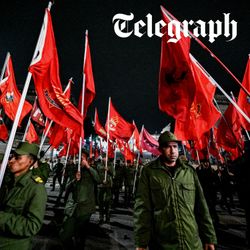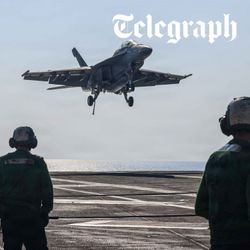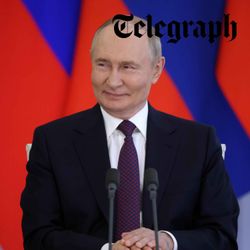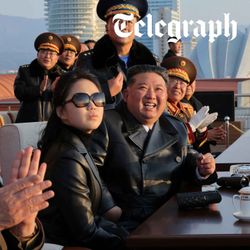Share

Battle Lines
The mood inside Iran as Israel plans retaliatory strike
•
In this episode of Battle Lines, we speak to the Telegraph’s Middle East Correspondent Nataliya Vasilyeva about how Israel will retaliate against Iran for their recent missile strikes. Then we speak to Holly Dagres, senior fellow with the Atlantic Council's Middle East Program and writer of the substack The Iranist, about how Iran and Israel's relationship has developed from a shadow war to the brink of a full-scale conflict.
Contributors
Roland Oliphant (Host, Senior Foreign Correspondent) @rolandoliphant on X
Nataliya Vasilyeva (Middle East Correspondent) @Nat_Vasilyeva on X.
Holly Dagres (The Iranist) @hdagres on X
Hosted on Acast. See acast.com/privacy for more information
More episodes
View all episodes

Cuba 'very close' to regime change: John Bolton on Trump, Venezuela and Iran
35:00|For sixty years Washington and Havana have been having a geopolitical tango fuelled by obsession and ideology. The island nation of Cuba has been a socialist splinter in the finger of the Florida coastline, its regime infecting the region. Now, with the toppling of Nicolás Maduro and Venezuelan oil tightly controlled by the US, Cuban President Miguel Díaz-Canel could be next. To get into the finer details of the US’s new found dominance in the Caribbean, Venetia is joined by The Telegraph’s foreign reporter, Lily Shanagher.Plus, former national security advisor John Bolton, voices the need for regime change in Venezuela, Iran and Cuba. Coining the phrase ‘Troika of Tyranny' in 2018, Bolton has had Cuba in his sights for many years as a rogue state. So what should happen next in the region? John Bolton lays bare the truth about Trump’s decision making and the need for swift action.Producer: Peter ShevlinExecutive Producer: Louisa Wells► Sign up to our most popular newsletter, From the Editor. Look forward to receiving free-thinking comment and the day's biggest stories, every morning. telegraph.co.uk/fromtheeditorContact us with feedback or ideas:@venetiarainey@RolandOliphant
Drugs, HIV and gangs: the Pacific island paradise hit by a triple epidemic
37:52|Drugs and gangs have created an explosion in HIV cases in Fiji.This week on Battle Lines: Global Health Security, Arthur Scott-Geddes is joined by Sarah Newey, The Telegraph’s correspondent in Bangkok who recently travelled to Fiji, and Dr Jason Mitchell, the head of the country’s HIV task force.On the archipelago known as the gateway to the Pacific, Chinese triads, Mexican cartels, and Australian biker gangs are all involved in a booming methamphetamine trade.The result is that an island paradise is now home to the fastest-growing HIV epidemic on earth.Read Sarah’s dispatch from Fiji:The island paradise with the world’s fastest growing HIV epidemichttps://www.telegraph.co.uk/global-health/science-and-disease/fiji-island-paradise-with-the-worlds-fastest-growing-HIV-epidemic/Producer: Sophie O'SullivanExecutive Producer: Louisa WellsStudio Operator: Meghan Searle► Sign up to our most popular newsletter, From the Editor. Look forward to receiving free-thinking comment and the day's biggest stories, every morning. telegraph.co.uk/fromtheeditorContact us with feedback or ideas:battlelines@telegraph.co.uk@venetiarainey@ascottgeddes
The 'super secret' Chagos island airbase at heart of Trump-Starmer row
32:17|The British Indian Ocean Territory, AKA the Chagos Islands is home to the American super-base of Diego Garcia. Located on the largest island in the archipelago and home to the joint UK/US military base since the 1970s.The Chagos handover to Mauritius has been controversial from the outset and shifting signals from Donald Trump have left the Starmer government open to a political backlash.Has the special relationship turned toxic over these islands? And should the sovereignty transfer be stopped? To discuss, Roland turns to Ben Judah who has worked for the previous foreign secretary and Chief Foreign Affairs Commentator, David Blair. Producer: Peter ShevlinExecutive Producer: Louisa Wells► Sign up to our most popular newsletter, From the Editor. Look forward to receiving free-thinking comment and the day's biggest stories, every morning. telegraph.co.uk/fromtheeditorContact us with feedback or ideas:@venetiarainey@RolandOliphant
Trump’s Iran plan: 'kick the door in' and hit the regime where it hurts
48:51|The drumbeat of war in the Middle East is getting louder - and once again it’s Iran in America’s crosshairs.A second round of talks over Iran’s alleged nuclear weapons programme ended this week without a deal. In the last few days, dozens of American fighter jets and refuelling tankers have joined the US's two carrier strike groups in the region. This is now the largest American military buildup in the Middle East since the Iraq war in 2003.Venetia chats to Henry Bodkin, The Telegraph's Jerusalem correspondent, and Roland Oliphant, chief foreign affairs analyst about when war might break out and how it could unfold.Plus Roland speaks to Maryam Mazrooei, an Iranian journalist and war photographer who fled the country after being arrested and imprisoned in 2022, about whether American-led regime change would spark a civil war in Iran.Read - Trump sends fighter jet squadron to ‘kick the door down’ in Iran: https://www.telegraph.co.uk/world-news/2026/02/18/us-military-aircraft-heading-towards-iran/Producer: Sophie O'SullivanExecutive Producer: Louisa Wells► Sign up to our most popular newsletter, From the Editor. Look forward to receiving free-thinking comment and the day's biggest stories, every morning. telegraph.co.uk/fromtheeditorContact us with feedback or ideas:@venetiarainey@RolandOliphant
Frog poison, tear gas and Novichok: Inside Russia’s chemical weapons programme
32:27|Two years ago, Russian opposition leader Alexei Navalny died in a Siberian penal colony. There was an outcry and many suspected foul play, but nothing could be proved. That is until last weekend, when five European countries including the UK announced that they had made a startling discovery: Navalny had been killed with a rare frog poison.How was the poison was identified, how were the samples smuggled out of Russia, and why does the evidence point directly to Moscow?Venetia and Arthur speak to former commanding officer of the UK’s Chemical, Biological, Radiological and Nuclear Regiment and Telegraph columnist, Hamish de Bretton-Gordon, and Dr Gemma Bowsher, Senior Research Associate for the Centre for Conflict and Health Research at Kings College London.Producer: Sophie O'SullivanExecutive Producer: Louisa WellsStudio Operator: Meghan Searle► Sign up to our most popular newsletter, From the Editor. Look forward to receiving free-thinking comment and the day's biggest stories, every morning. telegraph.co.uk/fromtheeditorContact us with feedback or ideas:battlelines@telegraph.co.uk@venetiarainey@ascottgeddes
North Korea 'names' 13-year-old nuclear heiress & inside Europe’s race to rearm
31:29|North Korea’s dynasty dictatorship has taken on a new leather clad, second-in-command. Reports from South Korea have suggested that Kim Jong Un’s daughter Kim Ju-ae is now the heir apparent in the totalitarian state. Could she one day be the youngest person to command a nuclear arsenal? Roland chats to The Telegraph’s Lily Shanagher and from the University of Oxford, North Korea watcher, Dr Edward Howell, to unpack what we know from the shadows.Plus, after the Munich Security Conference at the weekend, Europe is facing a new future without Washington’s steadying hand and will have to be less reliant on the Stars and Stripes. But is European defence manufacturing scaling up in line with these new demands? Roland speaks to Philip Lockwood from defence startup Stark to find out just how quickly the ambitions are being realised. Read Lily's article on Kim Ju-ae: https://www.telegraph.co.uk/world-news/2026/02/16/kim-opens-neighbourhood-families-soldiers-killed-ukraine/Pic credit: KCNA via ReutersProducer: Peter ShevlinExecutive Producer: Louisa Wells► Sign up to our most popular newsletter, From the Editor. Look forward to receiving free-thinking comment and the day's biggest stories, every morning. telegraph.co.uk/fromtheeditorContact us with feedback or ideas:@venetiarainey@RolandOliphant
Vance’s ‘Enemy Within’: How the US shocked Europe into rearmament
39:45|A year ago, JD Vance gave an explosive speech at the Munich Security Conference. It marked a fundamental shift in the relationship between the US and its European allies that have since been cemented through tariff wars, a new National Security Strategy and threats to take Greenland. So has Europe risen to the challenge laid down by Donald Trump's administration and started to take care of its own security? Is there any trust left in the trans-Atlantic relationship? And will there be another attack on Europe at this weekend's Munich conference? Venetia and Roland chat to David Blair, Chief Foreign Affairs Commentator, and Joe Barnes, Brussels Correspondent to find out. Read Joe Barnes's story on how Europe ‘must become military superpower’ to survive without US: https://www.telegraph.co.uk/world-news/2026/02/11/europe-must-be-military-superpower-to-survive-without-us/Read David Blair's analysis: https://www.telegraph.co.uk/authors/d/da-de/david-blair/Pic credit: Matthias Schrader/APProducer: Peter ShevlinExecutive Producer: Louisa Wells► Sign up to our most popular newsletter, From the Editor. Look forward to receiving free-thinking comment and the day's biggest stories, every morning. telegraph.co.uk/fromtheeditorContact us with feedback or ideas:@venetiarainey@RolandOliphant
Trump’s 9 million death gamble: One year since he axed USAID
37:07|Nearly a year after Donald Trump shuttered USAID, the world is still reckoning with the consequences. But what really happened next?Venetia Rainey examines the fallout and what it means for global health, security, and stability. Joined by Global Health Security Editor, Paul Nuki, she explores how the abrupt withdrawal of America’s largest aid agency sent shockwaves through the global aid system, disrupted lifesaving programmes, and potentially contributed to millions of preventable deaths.They are joined by Angeli Achrekar, Deputy Executive Director of UNAIDS, and Kevin Melton, a former USAID official and now CEO of PAX Strategies, offering insider perspectives on what was lost and what may be emerging in its place.Producer: Sophie O'SullivanExecutive Producer: Louisa WellsStudio Operator: Meghan Searle► Sign up to our most popular newsletter, From the Editor. Look forward to receiving free-thinking comment and the day's biggest stories, every morning. telegraph.co.uk/fromtheeditorContact us with feedback or ideas:battlelines@telegraph.co.uk@venetiarainey@ascottgeddesPic credit: Simon Townsley
Project Vault: Trump's battle to break China’s critical mineral stranglehold
41:49|Donald Trump has moved the war for critical minerals from the margins of policy to the heart of great power rivalry. In this episode of Battle Lines, we look at Project Vault, America's bid to take back control of the critical minerals and rare earths supply chain from China. This bid to build a vast new stockpile and industrial strategy was unveiled at the inaugural US Critical Minerals Ministerial Summit last week. Supporters see it as a necessary first step to protect American industry and national security. Critics warn that for middle countries, it may simply shift dependencies rather than break them.Venetia talks to Sibylline Chief Analyst Sam Olsen to unpack what Project Vault really means, why processing matters more than mining, and how China has weaponised its dominance in ways OPEC never could. Plus, a deep dive on how Greenland fits into the West's rare earths strategy. Greenland Energy, Business and Mineral Resources Minister Naaja Nathanielsen on that Trump deal, Chinese influence and the challenges of mining on the island. Producer: Peter ShevlinExecutive Producer: Louisa Wells► Sign up to our most popular newsletter, From the Editor. Look forward to receiving free-thinking comment and the day's biggest stories, every morning. telegraph.co.uk/fromtheeditorContact us with feedback or ideas:@venetiarainey@RolandOliphant